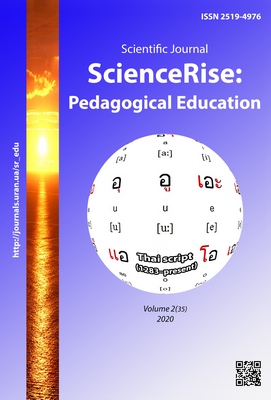Reforming of the ukrainian educational system in the context of transborder integration into the world academic space
DOI:
https://doi.org/10.15587/2519-4984.2020.198241Keywords:
world educational space, transborder integration, reforming, teachers, professional-pedagogical, scientific and methodological competenceAbstract
This article analyzes the experience of forming of the world educational space in the context of transborder integration. The world practice of solving educational problems is considered, essential characteristics of integration processes for further implementation in the educational process of the national educational system are revealed. The reports of the Davos Economic Forum, the INSEAD International Business School, Cornell University and the World Intellectual Property Organization, the Roman Club, the UN Human Development Indexes and Indicators, the World Education Forum, and the Cambridge Assessment non-governmental organization are analyzed. It is confirmed, that reforming of the Ukrainian educational system in the process of integration into the world academic space is due to the development and implementation of the legislative and regulatory documentation in the educational and scientific process of domestic educational institutions. The interim results of the national profile ministry on reforming Ukraine's education system into the academic world are characterized: priorities for 2019 in reforming of Ukraine's educational system in the context of transborder integration and current plans - "To do list" changes - that will be implemented in the fields of education, science and innovation theory. It is stated, that these tasks actualize the increase of HEA and STD teachers’ professional and pedagogical competence. Thus, the Model educational program of organization and carrying out pedagogical workers’ advanced training in postgraduate pedagogical education establishments in the profile of coaches’ and primary school teachers’ basic competences include the following: andragogic, vocational-pedagogical, socio-civic, linguistic and communicative information-digital. It is determined, that the conducted analysis actualized another important teacher’ competence - scientific and methodical, its definition in the author's vision is formulated. The problems of human resources and labor migration in the context of contemporary globalization challenges and the cross-border integration of Ukraine into the world academic space are investigated and recommendations are given for their solutionReferences
- Ilnytskyi, D. O. (2016). Hlobalna konkurentsiia v naukovo-osvitnomu prostori: intelektualno-resursnyi vymir. Kyiv, 512.
- The Global Competitiveness Report 2017–2018. World Economic Forum. Available at: http://www.weforum.org
- Ukraina pidnialasia na 7 pozytsii u Hlobalnomu indeksi innovatsii. 2018. Available at: https://talks.happymonday.com.ua/ukraina-u-globalnomu-indeksi-innovacij/
- Human Development Indices and Indicators 2018 Statistical Update. 2018. Available at: http://hdr.undp.org/sites/default/files/2018_human_development_statistical_update.pdf
- The Global Innovation Index (2019). Available at: https://www.globalinnovationindex.org/home
- Von Weizsäcker, E. U., Wijkman, A. (2018). Come On! Capitalism, Short-termism. Population and the Destruction of the Planet. Springer, 220. doi: http://doi.org/10.1007/978-1-4939-7419-1
- The world’s largest gathering of education and skills ministers (2019). London. Available at: https://www.theewf.org/
- Kyselova, K. Try innovatsiini trendy, shcho robliat osvitu efektyvnoiu i dostupnoiu. Available at: https://osvitoria.media/opinions/3-innovatsijni-trendy-shho-roblyat-osvitu-efektyvnoyu-i-dostupnoyu/
- priorytetiv na 2019 rik vid MON. Available at: https://www.facebook.com/Osvita.org.ua/posts/2249660868399352/
- Reforma osvity: u MON rozpovily pro osnovni zminy. Available at: https://osvita.ua/news/66739/
- Tolochko, S. (2018). Structured system analysis of determination of modern key competences in the world. ScienceRise: Pedagogical Education, 5 (25), 36–42. doi: http://doi.org/10.15587/2519-4984.2018.139110
- Tolochko, S. (2018). Analysis of European Experience in solving modern problems in education and science. ScienceRise: Pedagogical Education, 6 (26), 9–15. doi: http://doi.org/10.15587/2519-4984.2018.140642
- Tolochko, S. V. (2019). Teoretychni y metodychni zasady formuvannia naukovo-metodychnoi kompetentnosti vykladachiv u systemi pisliadyplomnoi pedahohichnoi osvity. Kyiv, 574.
- Tolochko, S. V. (2019). Kontseptsiia ta metodyka formuvannia naukovo-metodychnoi kompetentnosti vykladachiv u systemi pisliadyplomnoi pedahohichnoi osvity. Nizhyn: Vyd-vo NDU imeni Mykoly Hoholia, 376.
- Voitovska, O., Tolochko, S., Bordyug, N. (2018). Lifelong Learning in Modern Strategies of Sustainable Development. Studia warmińskie, 55, 343–353. doi: http://doi.org/10.31648/sw.3081
- Orazbayevaa, K. (2016). Professional Competence of Teachers in the Age of Globalization. International journal of environmental & science education, 11 (9), 2659–2672.
- Foulger, T. S., Graziano, K. J., Schmidt-Crawford, D. A., Slykhuis, D. A. (2017). Teacher Educator Technology Competencies. Journal of Technology and Teacher Education, 25 (4), 413–448.
- Harits, M., Sujadi, I., Slamet, I. (2019). Technological, pedagogical, and content knowledge math teachers: to develop 21st century skills students. Journal of Physics: Conference Series, 1321, 032011. doi: http://doi.org/10.1088/1742-6596/1321/3/032011
- Ouh, E. L., Irawan, Y. (2019). Applying case-based learning for a postgraduate software architecture course. Annual Conference on Innovation and Technology in Computer Science Education, ITiCSE, 457–463.
- Wagner, C., Kawulich, B., Garner, M. (2019). A Mixed Research Synthesis of Literature on Teaching Qualitative Research Methods. SAGE Open, 9 (3). doi: http://doi.org/10.1177/2158244019861488
- Rivilla, A. M., Ruiz-Cabezas, A., Navío, E. P., Medina Domínguez, M. C. (2019). Diagnosis of a teacher training programme in competencies for the first year of university. Aula Abierta, 48 (2), 239–249. doi: http://doi.org/10.17811/rifie.48.2.2019.239-250
Downloads
Published
How to Cite
Issue
Section
License
Copyright (c) 2020 Svitlana Tolochko

This work is licensed under a Creative Commons Attribution 4.0 International License.
Our journal abides by the Creative Commons CC BY copyright rights and permissions for open access journals.
Authors, who are published in this journal, agree to the following conditions:
1. The authors reserve the right to authorship of the work and pass the first publication right of this work to the journal under the terms of a Creative Commons CC BY, which allows others to freely distribute the published research with the obligatory reference to the authors of the original work and the first publication of the work in this journal.
2. The authors have the right to conclude separate supplement agreements that relate to non-exclusive work distribution in the form in which it has been published by the journal (for example, to upload the work to the online storage of the journal or publish it as part of a monograph), provided that the reference to the first publication of the work in this journal is included.








